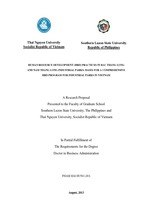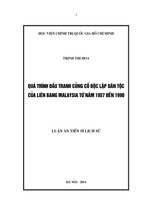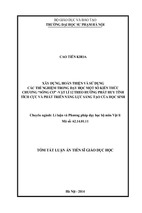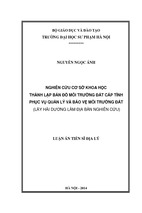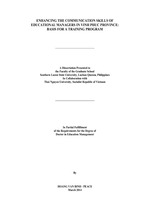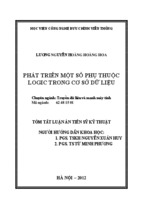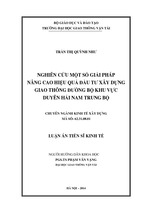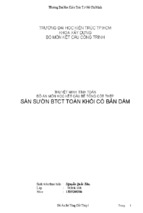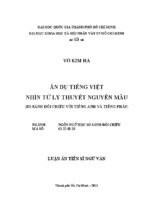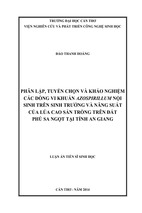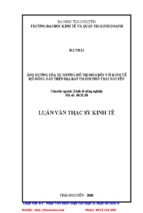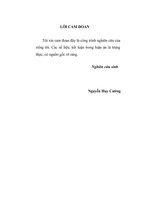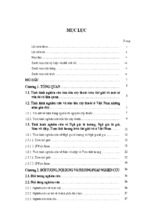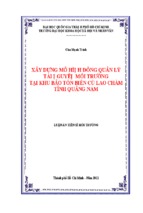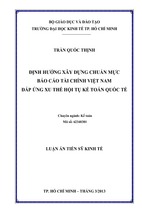1
INTRODUCTION
1. The necessity of the research
Factoring and Forfaiting service (collectively referred to as factoring
service) nowadays has been widely applied in many countries and regions all over
the world, especially in Europe and America. The reason for this development is
that these countries want to have an opener payment method than other methods
such as documentary credit, mail transfer, telegraphic transfer remittance and open
account to boost exports while ensuring safety and effective use of capital. Thus,
factoring – a mixture of payment, credit and insurance method was born hand has
become a trend in international trade payment.
In many countries, banks and finance companies play a very positive role in
supporting exporters in this field. In Vietnam, factoring service was started since
2004, when the Central bank promulgated Regulation on Factoring operations of
credit institutions; however, the service has not really developed so far. Turnover
from the service is still very limited due to objective as well as subjective reasons.
In the context of international economic integration with the World Trade
Organization’s membership of Vietnam since 2006, due to harsh competition,
enterprises must improve their conditions of payment to improve competitiveness
and expand export markets. To meet that demand, the development of factoring
service is a necessity. This requires awareness of the service both in theory and in
practice. With the reality that there’s no in depth research on the issue in Vietnam,
the author has chosen the topic "Developing factoring service for merchandise
export in Vietnam" to study the theoretical and practical development of
factoring service for merchandise exports in Vietnam.
2. Literature review of factoring service
Factoring service is the financial product popular in many countries around
the world, thus, there are many studies is done on the issue.
The research of factoring and forfaiting service in the world
About Factoring services, there are researches and documents such as: "Marketing
Internationnal Factoring", 2000, Neitherland of International Factoring Association - FCI,
“UNIDROIT Convention on International Factoring” - Ottawa, Canada, 28 May 1988);
“General Rules for International Factoring” - FCI); "Reducing the Cash Gap by
Factoring" of Daniel J. Borgia, Ph.D., and Deanna O. Burgess, Ph.D. (Assistant Professor
of Finance College of Business, Florida Gulf Coast University), or "Factoring as a
financing: Evidence from the UK", Khaled Soufani - Assistant Professor, Department of
Finance Concordia University, Montreal, Quebec, Canada; ...
About forfaiting services, there are researches and documents such as:
"Innovative Export Financing: Factoring and Forfaiting", Business America 114 (No.1,
January 11), Ring, Mary Ann, 1993; "Forfaiting A user’s Guide: What is it, Who uses it and
Why? "John F Moran, Jr. (Vice President of the British Am erican Forfaiting Company),
2
2002. Additionally, there are: "What is forfaiting?", Inc. D & B Reports. New York: Sep /
Oct 1993 Vol.42, Iss.5, p.46 (1 pp.), McDermott, Kevin. Dun and Bradstreet, or "The
ins and outs of forfeiting," Global Trade & Transportation, Philadelphia: May
1993 Vol. 113, Iss. 5, p.20 (2 pp.), Ring, Mary Ann, or the book "Forfaiting an Introduction", Finanz AG of Zurich, Switzerland, 2001; ...
The research of factoring service in Vietnam
Regulation on Factoring and forfaiting operations of credit
institutions (Together with Decision No. 1096/2004/QD-SBV by the Governor of the State
Bank); Curriculum "International payment in foreign trade" of Prof. Dinh Xuan Trinh,
Education Publishing House, 2002; “Factoring and Forfaiting Business" of MA. Nguyen
Quynh Lan, National Political Publishing House, 2006; "Factoring Development for
international trade finance in Vietnamese commercial banks" by Dr. Dang Thi Nhan et al,
2007; "Development of factoring business in trade finance operations and enhance
competitiveness of commercial banks in Vietnam", MSc. Huynh Thi Huong Thao, 2008; ...
3. Research objectives and research questions of the thesis
Objectives of the thesis
Overall objective: to propose solutions for the development of factoring
service for merchandise export in Vietnam.
Specific research objectives:
- Interpretating and systemizing the theoretical issues on the factoring
service and development of factoring service, the necessary conditions for the
development of factoring service. In particular it emphasizes the development of
the service for merchandise export.
- Assessing the conditions for the development of factoring service for
merchandise export in Vietnam.
- Analyzing and assessing the development of factoring service for
merchandise export in Vietnam.
- Proposing direction and solutions to develop factoring service for
merchandise export in Vietnam.
Research questions:
- What is Factoring and Forfaiting? Why should we apply factoring service
for merchandise export in Vietnam?
- Are there any factors/conditions which affect the ability to develop the
factoring service for merchandise export in Vietnam?
- Why factoring service has not been developed in Vietnam yet?
- How to develop the factoring service for merchandise export in Vietnam?
4. Objects and scope of the thesis
The object of the thesis
The object of the thesis is theoretical and practical issues on factoring
service for merchandise export in Vietnam.
3
4
The thesis focuses on the development of factoring service in the economy
from the perspective of an independent researcher. Therefore, factoring service is
considered as a kind of services in the economy (other than those previously
researches studied the service under the micro perspective, which is considered it
as a bank's operation). Thus, to develop this kind of service it is necessary to look
into both the supply and the demand sides as well as the macroeconomic
environment (government policy) so that finding "gap" between the banks’ supply
and business demand for the service, explains the question why the service has not
really developed in Vietnam.
The scope of the thesis
The approach: Within the thesis, factoring service is considered as a kind of
services in the economy. It is offered by commercial banks and financial
institutions and serves payment demand of the economy, particularly the payment
for export, and is subjected to the laws and policies of the Government. From this
research perspective, factoring service development is considered throughout the
three subjects, namely: the State - the management and adjustment
subject; Banks/financial institutions - the service suppliers and import-export
businesses - the service users. In particular, the study directs at developing
conditions for factoring service for merchandise exports in Vietnam.
The period of time: Reality of factoring service development in Vietnam is
focused from 2004 – 2012. Proposed solutions are for short term and middle term
(till 2020).
- New approach: factoring service is considered as a type of service in the
economy (other than those previously studied under the micro perspective, which
is considered the service as a bank's business);
- Clarify and systematize the basic theoretical issues of factoring service and
the development of the service in the economy;
- Focus on analyzing the necessary conditions for the development of the
service and assessing these conditions in Vietnam nowadays.
- Review the development experience of factoring service in several
countries in the world and propose lessons of Vietnam;
- Assess the demand for factoring service in the economy, thus to guide the
supply, aimed at increasing the quality of services.
- Analyze and evaluate completely and comprehensively the development
status of factoring service in Vietnam;
- Propose a system of feasible solutions aimed to develop the factoring
service for merchandise export in Vietnam.
5. Research Methodology
The method of dialectical materialism and historical materialism is basic
research method of the thesis. In each specific content, depending on the requirements
and conditions of the study, thesis using such different research methods to elucidate
the problems of theoretical and practical content as synthetic, inductive, deductive,
comparative methods; statistics, sample surveys, ...
The thesis combines two forms of desk research and in the field research to
solve the research objectives. To serve the objectives of the thesis research, the
primary data was collected through surveys of the author's thesis on the subject.
The survey objects are two main groups: (i) providers of factoring service
(banks); and (ii) the users of factoring service (import and export enterprises) in
Vietnam's economy. Data were collected by sending questionnaires directly,
sending e-mails through the link www.surveymonkey.com/s/lienhuong, by mails,
phone calls and direct meetings to interviewees. More than 300 questionnaires
were sent to the respondents and 174 valid votes shall be refunded. Refund rate is
58% survey.
6. New contributions of the thesis
7. The structure of the thesis
Besides the introduction, conclusion and appendices, the thesis is structured into
three chapters:
Chapter 1: Basic theoretical framework of the development of factoring
service;
Chapter 2: Current Development of factoring service for merchandise export
in Vietnam (2004-2012);
Chapter 3: Orientation and solutions to develop factoring service for
merchandise export in Vietnam (to 2020).
5
CHAPTER 1
BASIC THEORETICAL FRAMEWORK OF FACTORING SERVICE
DEVELOPMENT
1.1. Overview of factoring service
1.1.1. History and development of factoring service
Around 2,000 years ago, factoring was born along with the emergence of the
commission agents who specialize in the sale and implementation goods rotation. Until
14th and 15th century, these agents became powerful and started decentralization, they
also can ensure the ability to repay debts to the buyer. To the 16th century, the
American economy boomed and facilitated the development of factoring service in
America and had a great influence to the European market as well as neighboring
markets. The time of late 19th to early 20th century was a period of strong growth of
the factoring agent in the United States. However, factoring service development only
really be appreciated in the promotion of trade relation in general and international
trade in particular after the World War II. Till now factoring service has been widely
adopted in many countries and regions all over the world, especially in Europe and
America.
At the end of the 1990s, factoring service was introduced by a number of
foreign bank branches operating in Vietnam to domestic banks and
exporters/importers. However, by 2004, after Regulation on Factoring operations
of credit institutions was enacted, banks and financial institutions began to deliver
the service in Vietnam.
1.1.2. Concept and characteristics of factoring service
1.1.2.1. Concept under the Convention on International Factoring in Ottawa
According to Article 1 of the Convention on International
Factoring (UNIDROIT Convention on International Factoring - Ottawa, Canada,
28 May 1988): "Factoring activity is an activity which units acquired factoring of
receivables from customers arising from sale transactions or provide services but
late payments, whereby customers receive money advance corresponding to a
predetermined percentage of the value of the receivables. The value remaining
(after deducting expenses) will be paid to customers who purchase payment done"
1.1.2.2. Concept under the Regulation on Factoring operations of credit
institutions (Vietnam)
According to Article 2 of Regulation on factoring operations of credit
institutions, by the Governor State Bank of Vietnam dated 06/9/2004 issued
together with Decision No. 1096/2004 / QD-SB, the "Factoring is a form of credit
issued by credit institutions to the seller through the acquisition of receivables
arising from the purchase and sale of goods has been the sales and purchase
agreement for the purchase, sale ".
6
1.1.2.3. Characteristics of factoring service
- Credit characteristics: Factoring can be considered as a credit granted
when the unit advance cash payment to the seller and was refunded when factoring
unit demanded money from the buyer, the discount on the basis of values bill of
sale is that users rate loan (the sale) be paid to providers of capital (factoring unit).
- Collection characteristics: When using factoring service, the seller/
exporter transfers the debts (accounts receivable) for the factoring unit to receive
advance payment from the factoring unit so they will no longer have to worry
about the management and recovery of this debt. Factoring Unit will undertake all
the work on behalf of the seller/the exporter.
1.1.3. The form of the services: Factoring and Forfaiting
1.1.3.1. Factoring Service
According to Dictionary of the Economic - Christopher Pass & Bryan Lones:
"Factoring is a financial arrangement by which a professional finance company (also called
debt buying company - firm factor) buy the debts of a company with an amount less than the
value of the debt. Profits arising from the difference between the proceeds of the debt were
bought and the actual purchase price of the debt. Benefits of selling the company's creditors
obtain money immediately instead of waiting until the debt repayment to avoid further
inconvenience and expense in pursuing the debtor's late payment ".
Meanwhile Glossary Banks - Hans Klaus said that "factoring is a type of
funding in the form of debt transfer credit. A company transfers all or part of the
debt for a professional finance company (the company bought the debt, usually a
bank’s subsidiaries). The company is responsible for collecting debts and accounts
receivable tracking procedures to effect cost and time advance loans. Normally,
debt purchasing company must bear the risk of inability to pay debts".
1.1.3.2. Forfaiting Service
According to the book "Forfaiting - an Introduction", Finanz AG of Zurich,
Switzerland, 2001: "Forfaiting is the term used to refer to the acquisition of
liabilities in the future, arising from the delivery of goods or services, mainly from
commodity exports condition recourse to the exporter".
In the textbook "International payment in foreign trade", Prof. Dinh Xuan
Trinh, Education Publishing House, 2002, the "Forfaiting is a kind of long and
medium term credit that a commercial bank or a finance company non-refundable
advance exporters for a certain percentage of the total invoice amount to exercise
the power to reclaim the money from the importer and assume all risk that the
importer is unable to pay if it occurs. The Forfaiter only provide credit to exporters
to importers of him was a bank guarantee".
1.1.4. Benefits and limitations of factoring service
1.1.4.1. Benefits of the service
For sellers/exporters
7
8
- Being funded working capital on the basis of sales to revolving funds for
production and faster growth.
- Maintaining competitiveness by allowing buyers delayed payment for
goods.
- Improving operational efficiency through specialization of production.
- All credit risks are insured by 100% invoice value, financial situation
becomes healthier since it does not have bad loans on the financial statements.
For buyers/importers
- Being entitled to buy goods easily;
- No need to open L/C;
- Increasing purchasing power and still not exceed the credit limit allowed;
- Can quickly order without delay, at no cost to open L/C, or negotiated fee. ..
For service’s suppliers
- Gaining the revenues from fees and interest;
- Diversification of products;
- Expanding the market share and raising credibility in domestic and
international payment;
- Having opportunities to learn from the big Factor
- Providing information about the credit, and being benefited by exchanging
information with the data center.
For the economy
- Rising currency revolving cycle, making the rotation of money in society
increases.
- Facilitating the implementation of the deferred contract, the motivation for
promoting commercial activities both domestically and internationally, to promote
the development of production.
- Helping businesses avoid worries about risks in capital recovery, unpaid
business, creating a stable business environment for businesses.
For providers of the services
May face a number of risks, including credit risk, debt collection
risks; Fraud risk; Foreign exchange risk…
1.2. Factoring service development and necessary conditions for the
1.1.4.2. Limitations of the service
For exporters
- The factoring fee is relatively high, but the cost is usually born by the seller;
- The relationship between the seller with the customers may be affected by
the factoring unit, due to the fact the factoring unit will find a way to collect it from
the buyer;
- In some cases when disputes occurred between buyers and sellers, the supplier
will not pay/or recourse to the payments/transactions in advance to dispute it.
For importers
- Cost of goods under contract payments using payment services which may
be higher than when using other payment methods such as L/C;
- Units will be monitored factoring and debt collection activities in time...
development of the service
1.2.1. Concept and content of factoring service development
Factoring service development in the economy is process of planning,
implementing, controlling, creating favorable conditions and coordinate effectively
between stakeholders in the economy to make the factoring service becoming
increasingly popular, bringing practical benefits to both the business and
commercial banking system, becomes a form of financial assistance promptly and
efficiently, while improving the efficiency of the use of idle funds of banks, profit
bank, just support and facilitate the implementation of corporate deferred
contracts, promote trade and manufacturing development.
Development of factoring services in the economy should lead to some major
contents, such as cognitive development of factoring in all study subjects and
applications of factoring services; Perfecting the system of laws and policies to develop
the factoring services; Development system providing factoring services in the
economy; Development for factoring services in the economy; Creating and perfecting
competitive environment favorable for the development of factoring services.
1.2.2. The necessary conditions for the development of factoring service
1.2.2.1. Macroeconomic conditions
- Legal Environment
- Socio-economic Environment
- Thriving business activities inland and export activities
- Strong banking and financial system
- System Information Transparency
1.2.2.2. Conditions for factoring organizations (factoring service providers)
- Funds
- Human resources
- Network Operations
- Facilities, Technology
- Risk Management System
- The support services and other services
- The possibility of recourse debt
1.2.2.3. Conditions for import and export enterprises (factoring service users)
- There is a demand for factoring service
- Use the deferred payment method in payment for goods
- Human resources and qualified full understanding of factoring service
- Disclosure of information about business
9
10
1.3. Experience in developing factoring service of some countries in the
world and lessons for Vietnam
1.3.1. Overview of factoring operations around the world
Chapter 2
CURRENT DEVELOPMENT OF FACTORING SERVICE FOR
MERCHANDISE EXPORT IN VIETNAM (2004 - 2012)
Sales of factoring service around the world
2007
2008
2009
Europe
Continent
932,264
888,528
876,649 1,045,069
America
149,673
154,195
142,013
10,705
13,263
174,244
33,780
Africa
Asia
Oceania
Total
2010
(Mil. of EUR)
2011
2012
1,217,811
1,298,724
185,357
207,172
187,844
14,796
16,686
23,451
23,927
235,418
209,991
355,602
508,888
571,528
33,246
40,110
45,515
58,091
50,206
1,300,666 1,325,111 1,283,559 1,648,229
2,015,413
2,132,229
1.3.2. Experience in developing factoring service of some countries in the
world
1.3.2.1. Experience of the UK
1.3.2.2. Experience of France
1.3.2.3. Experience of Italia
1.3.2.4. Experience of Denmark
1.3.2.5. Experience of Thailand.
1.3.3. The lessons for the development of factoring service in Vietnam
- Raising deep understanding of the business and the benefits of factoring
service;
- Establishing a subsidiary or division/committee that specializes in
factoring services affiliated banks;
- Focusing on marketing for factoring services to entities in the economic
understanding and awareness of the benefits of factoring services;
- Improving the regulatory environment;
- Paying attention to frequently raise the level of human resources;
- Investing in the equipment and modern technology to enhance
competitiveness and promote trade activities through the internet (e-factoring, eforfaiting);
- Capital is the key issue, particularly important. The banks need to ensure
funding, including funding short-term, medium-term and long-term;
- Buiding an association of factoring organizations to act as the main
national links, and active support for the activities of its members.
2.1. Situation of merchandise export and the use of international
payment methods for merchandise export in Vietnam
2.1.1. International trade operations in Vietnam over time
International trade operations in Vietnam had many changes over the past
decade. From a low base, with 31.2 billion dollars in total imports and exports in 2001
(with exports of 15 billion dollars and imports 16.2 billion), after 11 years, to 2012, This
figure increased by 7.3 times, up to 228.3 billion dollars (in which exports and imports
114.5 billion USD 113.8 billion). Trade Balance of Vietnam, in the 10 years from 2001
to 2011, always in deficit. The years 2001 - 2006, the balance of trade deficit of just
under $ 5 billion/year, but the period from 2007 to 2011, the trade balance deficit has
stood at 2 numbers (regular $ 10 billion/year). However, after a long period of time are
the 2012 deficit of trade balance was a surplus of Vietnam although still modest level.
2.1.2. Current status of merchandise export in Vietnam in recent years
The export structure of Vietnam over the past 10 years there have been positive
changes, exports continued to increase, the share of exports in the direction of
decreasing raw commodities, processing products and focus on investment and export
goods with higher levels of processing. The growth of exports has been contributed
largely by the FDI sector.
By commodities, industrial products and handicrafts are always in the
leading position with the increasing trend in the proportion of total exports of the
country. Heavy industrial goods and minerals are in second place with a rate of
about 30%/year in the proportion of export turnover. Third place was the team of
agricultural products including: rice, rubber, coffee, cashew nuts, cassava and
cassava products, pepper. Aquatic products are constantly increasing in value but
decreased in proportion.
By market, Asian market (with average export turnover from 2007 to 2011
approximately 31.2 billion USD/year) is still the traditional market for Vietnam's
export items, in which main market countries are ASEAN’s nations and Japan. This
was followed by the American market (an average of about $ 15 billion /year), Europe
(about $ 13.8 billion/year), Oceania (average $ 3.3 billion/year) and Africa (average
export turnover of $ 1.3 billion/year) as the potential markets for Vietnam.
2.1.3. Current status of the use of international payment methods for
merchandise export in Vietnam
2.1.3. 1. International payment operations at the banks in Vietnam
Imports/ exports and international payment turnover are generally
proportional relationship to each other. In the structure of payments, payment of
export sales typically account for about 46% of the total sales of commercial banks
in international payment.
11
12
Regarding the structure of the market, currently the majority of banks in
Vietnam are providing international payment services, but market share is
primarily focused on four major banks that have extensive experience in providing
services such as Vietcombank, Agribank, Vietinbank, BIDV.
Besides, when implementing of international factoring, Vietnam also allows the
parties may agree to apply the rules and international practices of factoring if that are
not contrary to the laws of Vietnam. This creates favorable conditions for the
development of factoring service in Vietnam in accordance with the international rules.
· Relatively stable economic environment
Socio-economic environment of Vietnam through time remains stable GDP
growth are impressive, the rate of inflation was curbed, abundant labor resources,
production capacity and demand for goods are large due to its large population. In
the field of factoring service, Vietnam has caught the attention of the association of
international factors - Factors Chain International (FCI). So, FCI has access
initiative and willingness to help Vietnam develop this service. FCI has organized
many seminars and programs to support the development of the service in Vietnam.
· Import-export business activities of the enterprises are to facilitate
Recently, the commercial activity in general and international trade in
particular has received much attention and support facilitated by the
Government. More activities are encouraged; more actors are participated partly
thanks to the more liberal provisions on the right to market access. In addition, the
State has taken many measures and policies to support the activities of international
trade, particularly export activities oriented to reasonable protection for businesses.
· Form of deferred sales growing
To improve competitiveness, one of the measures which are now the business
is usually applied preferential rates, the deferred payment terms for buyers/importers.
The form of deferred sales growing leads to the increase in funding needs and brings
new opportunities for the factoring service, in addition to the traditional services
system, contributing to support and encourage the enterprise’s efficiency. These are
favorable conditions for the development of factoring services in the economy,
particularly international factoring.
· Information base data
Vietnam has a credit information center (CIC) managed by the State
Bank. CIC collects information on borrowers in all credit institutions (banks)
operating under the Law on Credit Institutions, and organizations such as
investment and development funds, the Credit Guarantee Fund, CIC also signs and
implements information exchange agreement with the international news agency to
help Vietnamese banks and credit institutions have the information to do business
with foreign countries.
2.1.3. 2. The proportion of payment methods used in export payments in
Vietnam
For the payment of export, the major commercial banks in Vietnam
providing money transfer services, collection and payment services L/C, and
present the vouchers as payment L/C, discount vouchers products,... Vietnamese
export’s contracts increasingly use multiple methods of payment, while payment
by L/C and collection tend to decrease.
Using many methods of payment brings many risks for export enterprises in
Vietnam. Therefore, banks need to provide more services for export credit guarantees,
development of new products such as factoring services to help businesses secure when
they enter foreign market.
2.2. Conditions for the development of factoring services for
merchandise export in Vietnam
2.2.1. The need for development of factoring service for merchandise
exports in Vietnam
The development of factoring services in merchandise exports in Vietnam
today is essential because: First, factoring is a financial service represents the
aggregate outstanding advantages, especially in conditions of economic
integration. Secondly, Vietnam's enterprises are limited in capital, human resources,
market information, risk management level ... When developing this service, sources
of venture capital industry will be improved and the bank will be diversifying its
product. Thirdly, using factoring service is a good solution, especially for small and
medium enterprises in the fierce competition conditions of the current international
market, when to accept the deferred sales method. Fourth, after joining WTO,
Vietnam banks must continually diversify products to meet the financial needs of
customers, creating benefits for clients in order to attract customers, increase
competitiveness for its banks. Factoring is one of the services to meet these
requirements and should be developed by commercial banks.
2.2.2. Analysing the situation of factoring service development for merchandise
export in Vietnam
2.2.2.1. Macroeconomic conditions
· Legal Environment
Basically, in Vietnam there was a legal framework for factoring
operations. Regulation on factoring activities of credit institutions issued together
with Decision No. 1096/2004/QD-SB dated 06/09/2004 by State Bank of Vietnam’s
Governor initially created a legal framework for the development of factoring
services in Vietnam. However, these regulations are inadequate, causing difficulties
for the supply and use factoring services in Vietnam.
2.2.2.2. Conditions for factoring organizations (factoring service providers)
· Take advantage of the following
As a latecomer in the application of this service, Vietnam will facilitate learning
experiences of other countries in the region and in the world. Through lessons learned
from the advanced countries, Vietnam's commercial banks can draw their own lessons.
· The market has great potential
FCI has received the Asian market has a great potential to develop the
factoring service. In Asia, Vietnam is a very new market, market segmentation is not
13
14
clear, the market share of the ahead organization is less, the majority of
organizations are still in the process of exploration or testing experiment. Thus,
opportunities for Vietnamese banks to participate and dominate this market is huge.
· Capital raising activities of banks growing
Banking system grows with the growing number of commercial banks. In
recent years, the economic development and improving people's living standards
make commercial banks to increase the ability to mobilize capital, expand capital
ratio deposits. Large funding sources are good conditions to allow commercial
banks to deploy factoring service.
· Banking system has quickly seized the opportunities
Currently export activities are facilitated, making the demand for the banks’
international payment services banks increasing. In addition, all Vietnamese banks
now have close connections with the global financial system, has correspondent
relations with banks worldwide. Besides, many of the commercial banks in
Vietnam are seeking to expand overseas operations by setting up representative
offices and branches. This enables banks to implement the provision of factoring
service easier and more efficient, especially international factoring.
· Human resources
Currently, the human resources of commercial banks in Vietnam are
plentiful, as professionals, can basically meet the requirements in part to the
development of factoring services.
· Management and technology systems to meet the eligibility requirements
Since 2003, with the assistance of the World Bank, Vietnam's commercial
banks have made the project of Modernization of banks and payment systems
(INCAS), system operation management, accounting and business processing on
the computer. With the conditions and management of current technologies,
commercial banks in Vietnam can afford to deploy factoring service.
In Vietnam today, audition has been interested by enterprises but have not
really taken seriously, that information published is still dishonest. This is the
reason why the information environment in Vietnam lacks transparency. It is a
major obstacle to the development of factoring service in Vietnam today.
2.2.2.3. Conditions for import and export enterprises (factoring service users)
Demand for using factoring service in import and export businesses
Currently, Vietnam has about 500,000 small and medium enterprises,
accounting for 97% of businesses throughout the country. These businesses
typically have very high demand but difficult to raise capital from outside.
Meanwhile, the factoring service is a powerful tool that can help businesses gain
access to capital from external sources, especially from banks. So, once businesses
realize the full benefits of factoring service, the demand for this service will
increase in Vietnam.
· Human resources of Vietnam’s export -import business
Civil Vietnam’s export - import business is now capable of owning a team
of qualified professionals to meet the job requirements. However, the knowledge
and professional expertise as well as experience using the factoring service of the
business staff in the import and export businesses (need conditions to businesses to
be able to use the service effectively) is still weak.
· The issue of information transparency in Vietnam’s businesses
·
2.3. Analysing the real situation of factoring service’s development for
merchandise exports in Vietnam (2004 - 2012)
2.3.1. Current status of the legal system and development factoring service
policy
The factors of institutional and policies related to the field of factoring
service are still unclear, unsettled, not to support for service development yet. The
birth of Regulation on factoring activities of credit institutions has created a legal
framework for the supply and use factoring service in Vietnam. But basically, this
regulation is not yet complete and consistent, there are inaccuracies or unclear,
some rules are not consistent with international ones. There is no strategy or
development plans for factoring service of the country.
2.3.2. The situation of factoring service’s providers
2.3.2.1. The number and type of units providing factoring services
The introduction of Regulation on factoring activities of credit institutions in
the third quarter of 2004 was initially created motivation for the credit institutions
to deploy and develop the service. By 2005 there were nine commercial banks in
Vietnam is licensed to deploy factoring service (including 5 Vietnamese
commercial banks: VCB, ACB, Techcombank, SCB, OCB and 4 foreign banks
are: Deutsche Bank AG - Ho Chi Minh City, Far East National Bank (FENB) - Ho
Chi Minh City, UFJ Bank - HCMC, Citibank - Hanoi branch).
Then some other banks also had to take turns, such as import-export Joint Stock
Bank (Eximbank), International Bank (VIB), South East Asia Bank (Seabank), ...
By 05/2008, there were 24 licensed banks offer factoring service in Vietnam,
including 17 Vietnamese commercial banks. Currently, more other commercial
banks in Vietnam have been approved by the State Bank to deploy factoring service
(Army Bank, Dai A Bank, Petroleum Bank, ...) bringing the number of commercial
banks in Vietnam allowed to provide the service to 22.
In addition to commercial banks, finance companies have also implemented
the factoring service. There are five financial companies (Power Finance
Corporation, the Petroleum Finance Company - PVFC, Finance Company
Shipbuilding Industry, Handico Finance Corporation, Coal and Minerals
Financials Company) allowed to provide this service.
However, the fact is that only a few banks actually have factoring transactions
on the market, including Vietcombank, HSBC Vietnam, Vietnam UFJ, ACB,... but
mostly in domestic payment and supplying the type of recourse factoring.
2.3.2.2. Sales of factoring service
According to statistics of the FCI, factoring turnover of Vietnam continued
to increase from 2005 to 2009. In 2005, sales of 2 million EUR, by 2009 this figure
had risen to 95 million EUR. In particular, the year 2008 is considered to be the
15
16
most spectacular growth in sales factoring in 2005-2009, growth rate is 97.67%
compared to 2007, however, move into 2010, the sales has fallen to 65 million
EUR. In 2011, factoring sales showed signs of recovery despite the relatively slow
pace. But by 2012 the factoring turnover of Vietnam to drop, only 61 million EUR.
regular use is 47.3% and 8.3% do not use. Loan’s sources of surveyed enterprises are
primarily from banks (80.2% of respondents use bank loans). Forms of bank funding
that businesses are often the most used are trade credit and bank
guarantees. Meanwhile, factoring has not been much interest, 74.6% of businesses
never use factoring service, while enterprises can use this service only 13.3%.
Sales of factoring service in Vietnam
Mil. Of EUR
100
90
80
80
60
41
Domestics
42
40
40
International
40
25
25
15
20
2
0
5
2
1
21
5
0
2005
2006
2007
2008
2009
2010
2011
The usage
Regularly
Yes, but not often
Never use
Total
Number of enterprises
22
20
123
165
The rate selection
13.3%
12.1%
74.6%
100%
2012
In 2010 and 2011, although the total amount of the factoring service in
Vietnam reduced but that of international payment was increased (5 times the
sales of international factoring in 2009), accounting for 38.5% of total sales
factoring of Vietnam in 2010 and 37.3% in 2011. This shows the trends and
prospects for supply and use factoring service of banks and enterprises in Vietnam
gradually in line with the trend of development of an open economy towards
export promotion.
2.3.2.3. Type and quality of provided service
About types of the service, commercial banks in Vietnam have only provided
factoring service and have provided both 2 types: domestics factoring and
international factoring. And according to the survey results of the author's thesis, the
commercial banks in Vietnam are mainly provided only kind with-recourse
factoring, while without-recourse factoring is difficult to be provided by banks
because of the ability to assess and and the banks’ low ability to prevent risks.
Regarding the quality of factoring service, after a period of time, Vietnam
enterprises have evaluated some remarks as follows: Service quality is not high; The
high cost; Time for payments is long; Complex procedures. This is the major
constraint for the development of this service in Vietnam.
To assess the effects of regular use of loans for usage of factoring service by
businesses, the thesis author uses the model to Chi-Square Test. The results
showed that the frequency of the use of loans and how often they use factoring
service closely related to each other. Specifically, businesses often use external
loans tend to use factoring service more often.
As for the demand and necessity of factoring service for export activities of
Vietnamese enterprises, 77.8% of enterprises surveyed estimated that factoring is
needed (in which 22.2 % considered “very necessary” and 55,6% considered
“necessary”). Only four firms (2.9%) considered “unnecessary”. Thus, the majority of
Vietnamese exporters has noticed and appreciated the role of factoring service in
promoting trade activities in general and international trade in particular. This shows
that the potential market is very large and has not been fully exploited. Therefore, it can
be assessed that the market demand for factoring service is great.
0.7%
2.2%
22.2%
19.3%
Very necessary
Necessary
So so
Not really necessary
Absolutely unecessary
100%
90%
80%
70%
60%
50%
40%
30%
20%
10%
0%
55.6%
Cost to pay for the
service by the enterprise
Very high
Requirement by banks
Quality of the current
Factoring service
High
Medium
Low
Very low
2.3.3. Situation of consumer demand/ use of factoring service
According to survey data, the businesses have an interest in using the loan, but
the number of businesses often use loans is only 44.4%, while the proportion of non-
2.4. Assess the status of the development of factoring service in general
and factoring service for merchandise exports in Vietnam in particular
(period 2004-2012)
2.4.1. Achievements
- Have a basic legal framework as a basis for the development of factoring
service in Vietnam.
- Sales of factoring service increased significantly, sales of international
factoring maintain stability in certain degree.
- The number of organizations providing factoring services is increasing.
17
18
- Type of factoring services by commercial banks in Vietnam to supply
increasingly diverse.
- Demand for factoring services by enterprises, especially Vietnamese
exporters is increasing.
Chapter 3
ORIENTATION AND SOLUTIONS TO DEVELOP FACTORING
SERVICE FOR MERCHANDISE EXPORTS IN VIETNAM (TO 2020)
2.4.2. Limitations
- Number of factoring organizations having transaction really is not high,
limited supply of factoring services market.
- Sales of factoring transactions are limited.
- Types of the service is poor, and lack of appetite for Vietnam enterprises.
- Quality of the service is not highly appreciated by the enterprises,
procedures cumbersome, time evaluation by banks is slow, making it difficult for
businesses.
2.4.3. Causes
2.4.3.1. Causes of macroeconomic conditions
- Incomplete and not- synchronized Regulatory environment, some rules are
not consistent with international.
- Incomplete information and lack of transparency.
2.4.3.2. The cause of the factoring service’s providers
- Many banks are not aware of the importance and the benefits of factoring
service.
- Banks’ financial potential is lags, lack of management experience.
- Management capacity of commercial banks is still weak, the risk
management system has not reached a high level;
- Lack of coordination between the banks, the relationship with foreign
markets of Vietnam's commercial banks is limited;
- No insurance fund for bank credit;
- High factoring fee hinders the development of this service.
- Factoring service is not really convenient for businesses;
2.4.3.3. The cause of factoring service’s users
- Deferred sales are not recognized as a common form.
- The understanding and concern about factoring businesses is limited.
3.1. Economic context affects the development trend of factoring service
for merchandise exports in Vietnam
3.1.1. Demand for economic integration
3.1.2. Economic growth
3.1.3. Exports and imports rise
3.1.4. Demand for funding and hedging in international payments
3.2. Development orientation of factoring services in Vietnam
3.2.1. The general development orientation of the banking sector
- Meet the requirements of international and national standards;
- Develop services on a large scale: in addition to commercial banking
system and encourage other institutions such as financial companies in Vietnam to
involve;
- Develop in-depth services: building staff qualifications and experience, to
diversify the types of factoring,...
- Reduce costs and risks when factoring service is applied
- When factoring business of the banks was strong enough, can be carried out
separately factoring company established under the bank;
- Strive to be a member of the association of factoring large in the world;
- Gradually replace the method of credit payment by factoring.
3.2.2. Development orientation of factoring service for Vietnam’s banks
- The number of banks providing factoring services: Licensed commercial
banks need to quickly deploy the service; encourage and create conditions to allow
banks and other financial or credit institutions in Vietnam to participate in the
market of factoring service to increase the number of units provided.
- The model: Establish factoring units within the suppliers’ structure; State
Bank of Vietnam may also allow large international corporations established under
the factoring company in order to expand the market; Establishment of support
funds, construction factoring association of the country.
-The type of factoring service provided: Factoring service providers should
apply all types of factoring, particularly full - factoring, forward deploy forfaiting
in 2015.
- The quality of factoring services: Improve the quality of factoring service,
developing forms of recourse factoring, expanding the application of international
factoring to the whole banking system in Vietnam.
- Customers: Focusing on small and medium business group; Priority
businesses export of staples; provides incentives for traditional customers; Promote
and introduce products to customers.
- The factoring sales: To 2015 the orientation is to recover and gradually
factoring turnover to 100 million EUR. In which: International factoring continues
19
20
to rise, often accounting for over 20% of total sales; the growth rate of sales per
year followed by 30 to 40%.
- The international cooperation: Strengthening cooperation with agents,
banks around the world, facilitating the collection and evaluation of information to
customers; strengthen and enhance the reputation of the commercial banks in
Vietnam on the world market.
each period; DN must be submitted to CIC summary audited assets, income and
expenditure report, ...
- CIC's unified rules which must be registered as legal collateral loans /
financing by banks.
- Prove to banks and businesses see the benefits that CIC gives the economy
and for the banks, businesses; There are incentives obvious physical benefits to
increase the performance of CIC.
3.3. Solutions to develop factoring service for merchandise exports in
Vietnam
3.3.1. Macro Solutions
3.3.1.1. Completing the legal system, policy on the service’s development
State Bank should continue to revise and promulgate a synchronized legal
system, fully overcome the problem of incomplete and old Regulation and
correspondence to the rules of the Convention on International Factoring. New
legal text note to a number of issues: Separating operations and factoring loans,
with management rules and controls separately, creating a legal framework to
protect the basic rights of the parties ; There is clearly specified conditions for
participants providing factoring services, extended supply objects, towards the
establishment of an independent factoring company; There should be provisions on
the rights of creditors of the receivables to minimize risk to providers of factoring
services; ...
Government should urgently develop a comprehensive and long-term
strategy/development plan for factoring service.
3.3.1.2. Building policies to encourage and support the factoring service
State should have policies and specific directions for the development of the
services sector as well as building policies, appropriate measures to encourage and
support the factoring services, such as loosening and improve policies on credit
and financial management, policies, foreign exchange management, and
administrative barriers such as administrative procedures, licenses, quotas, policies
discriminate against types of businesses.
3.3.1.3. Stable and complete trade policy
- Promote the foreign, especially trade with major markets such as China,
ASEAN, the EU, ...
- Reduce costs and increase competitiveness of goods in the regional market
and the world through effective exploitation of the advantages of resources, land,
people, ...
- Technological innovation, improve product quality, boost exports of
processed goods, ...
- Implement policies to encourage exports through macro-management tools
such as taxes and subsidies; ...
3.3.1.4. Improving the quality of operation of the Credit Information Center
- Increase investment in facilities, equipment, staff training.
- Specific regulations on banks have fully informed about the financial
situation, the situation of borrowing and repayment of the company for CIC in
3.3.1.5. Establish a credit rating company
To factoring services development, especially international factoring - a lot
of activity underlying risks when evaluating the financial capacity of the partners
need to establish credit-rating companies to can minimize these risks. To establish
the credit rating company need technical assistance from a internationally
renowned credit rating one. To ensure the independence and high communitiness,
the credit rating companies in Vietnam should be joint – stock ones and set a
percentage ownership rules reasonable with shareholders.
3.3.1.6. Intensify training on factoring service in universities and colleges
The introduction of factoring not only the duty of the bank to do early just in
training programs for students of economic universities and colleges. Universities
and colleges need to put the theory of factoring into the curriculum to prepare
students with a basic background knowledge about this issue when the school.
3.3.2. Solutions for factoring service’s providers (banks)
3.3.2.1. Recognize the necessity of the development of factoring services and the
appropriate organizational model to develop the service
Need aware of factoring services, the benefits that it provides, see it as a
profitable opportunity for banks. Need plans and specific programs to introduce
and disseminate knowledge about factoring in their bank or associated with banks,
institutions, other entities organized to introduce this service to related objects. In
addition, the need to build a real organizational model appropriate and
effective. Could be: A business unit within the Department of the bank concerned
(such as the factoring division of the International Chamber of billing, Office of
international banking, credit management departments, ...) or A Room dye
factoring bank/finance company, or a subsidiary of the bank, could also be a
subsidiary of a corporation or financial industry, or a full company independent
(possibly state-owned companies, joint ventures, foreign-owned companies,
private companies)
However, in the current phase, perhaps organizational model most effective
and feasible as a model factoring Chamber of banking/financial company or a
subsidiary of the bank/finance company.
3.3.2.2. Strengthen marketing for factoring service
Promotional strategy, product marketing factoring effective way. In the
future, the urgency faced by the banks is to build a marketing strategy specifically
for factoring operations; The strategy must be broad and thorough individual
officers and staff deployed operations.
21
To promote their products, banks can through various forms of advertising
in the mass media, flyers, send letters of recommendation, ..., as well as enhance
the thematic workshops "factoring services"
3.3.2.3. Develop human resources for factoring service
Banks should develop a strategy specific personnel recruited from the stage
to the stage of training and retraining staff to use it. In doing so, the bank should
pay attention to: Build system standards in staff recruitment; Develop appropriate
treatment regime; Construction plans regular training, capacity-building for human
resources; Building regulations for quality testing staff periodically; At the same
time, focus on building a team of managers, team leaders capable of operating with
professional qualifications, moral purity, is capable of better operating activities of
banks have said encouraging lower-level officials to work effectively.
3.3.2.4. Improve the financial capability of commercial banks
To develop the factoring services necessary to develop a system of financial
institutions and intermediaries diverse enough, on the basis of a system of regional
level commercial banks and international, towards the formation of financial group
universal banks likely dominate the market both at home and abroad. To enhance
financial strength, commercial banks can: equitization, issuing shares to the
public; or Buy and merging a number of domestic banks
3.3.2.5. Improve the quality of factoring services
Improving the quality of service factoring is specifically expressed by
indicators such as diversifying the types of factoring, advance percentage increase,
factoring reduction, ... In Vietnam today, there is only factoring (not forfaiting) and
factoring are usually with recourse factoring, in the future need more research and
development of new products, such as without recourse factoring, whole factoring,
partial factoring, publicity factoring ... Besides, banks need to study, to calculate
factoring fees gradually reducing to attract customers using this service. At the same
time, simplify procedures, create favorable conditions for businesses to use this
service.
3.3.2.6. Strengthen the relationship between the factoring units
Banks should actively in expanding relations with factoring organizations at
home and abroad, building a strategic agency relationships. In particular need:
Dedication of correspondent relations with customer relations; Actively expanding
agency relationships with institutions overseas factoring; Regularly collect data on
business performance and the ability of the dispute settlement factoring
agent; regularly monitor and evaluate the relationship with the agent to choose the
factoring unit effectiveness.
3.3.2.7. Apply effective measures to prevent risks
Develop and apply tools, preventive measures appropriate risk-based:
Enhancing quality appraisal; There is regular monitoring plan; Establish
relationships with credit institutions to promote the exchange of
information; Factors bind to ensure; Clearly specified methods of debt
collection; Insurance Receivables conducted advance.
22
3.3.2.8. Select target customers
Factoring Organizations must choose exactly goods and customers, thay can
implement successfully and efficiently factoring transactions.
For products: products that best suit a factoring service as raw materials,
components and consumables (products do not require sales service or
maintenance, warranty); The bill is transferred to debt collection is an
unconditionally.
For businesses:
Enterprise Sales: Selling is being done or sales inquiries by the method of deferred
payment; Financial situation, good business, good management skills; Having
experience in production and export business products; Having relationships fine
tradition with the purchasers; There are great deals to traditional banking, factoring
organizations and units hedging.
Purchase business: financial situation, stable business; Having the prestige and
experience of the product on the market is factoring; Having good management.
3.3.2.9. Focus on the customer advice operation
Bank may advise clients concerning matters export, import, international
settlement, especially factoring, just increase the fee revenues for banks has
contributed to improving business effectiveness for business, attract more
customers to the bank. As consultants, should the potential customer towards
changing habits to switch to a new service - factoring.
3.3.2.10. Improve banking technology; modernize the banking system under
the international level
Continue to innovate, modernize banking technologies, strengthening and
building mechanical systems, software engineering and modern, including
computer networking systems such as international SWIFT network, network
Reuter, System facsimile, telex, ..., software applications are widely used in
factoring services such as LTP systems EDIFACTORING or trade.net,
tradesurface.
Need to catch up and fast deployment of scientific and technological
achievements, to modernize the banking system in accordance with international
presence, by the way: Strengthening joint ventures and cooperation with other
organizations in and abroad; Finalize payment technology and banking information
system; Accumulation and concentration of capital for investment in technology
development.
3.3.2.11. Establish the association of national factoring service
Establishing a association to link factors. This association will be the focal
point of the activity statistics factoring unit in Vietnam, as well as a focal point to
organize professional training courses for banking organizations to provide
information to businesses and the economic sectors want to find out about this
service and resource lookup information on factoring unit in Vietnam, ...
3.3.3. Solutions for users of factoring service (import and export
businesses)
23
3.3.3.1. Develop business strategies of enterprises
Enterprises need to develop a strategy for their business and production
accordingly. This is a comprehensive strategy, including the strategy of
production, product strategy, market strategy, ... In addition, the formulation of
strategy should be based on an assessment of the ability inside and outside,
especially to market research, business partners at home and abroad, activities and
trends of the major competitors in the international arena.
3.3.3.2. Improve the quality of human resources in business
Need to develop strategies to foster and enhance management skills,
workplace skills for workers. Need to build a new management team, management
team nearby, training staff on professional expertise, in light of ethics in the
import-export business contributes to accelerating deployment of factoring
services factoring and forfaiting payment in Vietnam.
3.3.3.3. Diversify the use of payment methods
Regular use of deferred payment method is the basis for application in
practical factoring. Enterprises need to raise the level of knowledge in choosing the
method of payment in commercial transactions, especially should study about
factoring services domestically and internationally for more new options provide
more benefits of business activity.
3.3.3.4. Raise the awareness about publicizing information
Businesses need to be aware of the benefits of publicizing information,
overcoming hide the truth about themselves, promote the good, conceal the true
financial information. To do this requires further enhance the effectiveness of audit
and issue the required regulations and publish audited financial statements.
24
CONCLUSION
While factoring service is emerged from a long time in the world but is still
relatively new in Vietnam. This service has been established based on the essential
needs of the economy. Vietnam is promising to develop this type of service. The
problem is the need to have the total solution to encourage and facilitate the
development of these services in practice.
With the aim of developing the factoring services in merchandise exports in
Vietnam, the thesis focus on solving the problems as follows:
The thesis tries to systematize the theoretical issues related to the
development of factoring services such as: History and development of the concept
and the characteristics of the factoring, the benefits also such limitations Factors
factoring n, the form of factoring. Besides, the thesis also analyzes the necessary
conditions for the development of factoring services and summarizes some of the
experiences of countries around the world to find lessons for Vietnam in the
process of service development this.
The thesis analyzes the current situation of the use of international payment
methods in payment of export goods in Vietnam as a basis for the analysis and
evaluation of the necessary conditions and situation development services
Factoring in merchandise exports in Vietnam. The analysis and evaluation showed
that Vietnam is in the period just started implementing this new service. Although
there is much potential but the current reality, factoring is not really developed in
Vietnam for many reasons, including the reasons for subjective and objective
reasons.
The thesis also indicates the impact of factors affecting economic growth
and factoring services-oriented development of factoring services in Vietnam in
the coming time. On that basis, the thesis proposes a system consisting of three
basic solutions to develop the factoring services in the export of goods in Vietnam,
namely: macroeconomic solutions from State to As a manager, solutions for banks
as providers of services and solutions for import and export businesses as users of
factoring services. These solutions need to be carried out in a synchronous manner.
Strengths of the study's thesis research problem is quite new and the urgency
is clear. Especially the evaluation of conditions and propose solutions development
services factoring in merchandise exports in Vietnam came from all three entities
(the State, the service providers and service users). However, because this service
is not popular in Vietnam, an investigation, data collection faced many practical
difficulties, the survey sample is not large, yet highly representative. It is a
weakness of the study.
- Xem thêm -



